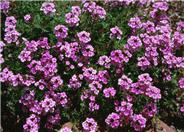
Common name:Peruvian Verbena
Botanical name:Verbena peruviana
This perennial forms a flat mat that covers an area rapidly. It has dark green leaves with clusters of bright flowers that bloom all year. Hybrids will have a little more height, different flower colors and spread more slowly. It is drought tolerant.
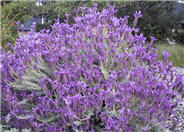
Common name:Spanish Lavender
Botanical name:Lavandula stoechas
This dense shrub grows 2-3 ft. tall with blue gray foliage and deep purple flowers that have large showy bracts near the top of the spikes. It is drought tolerant . - Cornflower Farms
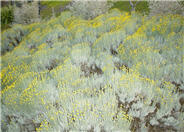
Common name:Lavender Cotton
Botanical name:Santolina chamaecyparissus
This ground cover/small shrub will grow to 3' tall and has small, grayish/silver leaves with yellow flowers that bloom in the summer.
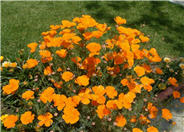
Common name:California Poppy, Golden Poppy
Botanical name:Eschscholzia californica
This small annual (sometimes acts as a perennial) plant will grow to less than 1' tall and has light, small blue/green leaves with gold and orange flowers that bloom in spring and summer.

Common name:California Coral Bells
Botanical name:Heuchera micrantha
Coral Bells is a perennial for shade or part sun that stays tight in in its growth habit to 3-5 in. high. The flower stalks reach about 2 ft. or more with many small white spring flowers. It is a California native and attracts hummingbirds. -Cornflower Farms
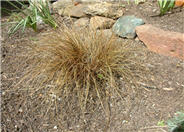
Common name:Leather Leaf Sedge
Botanical name:Carex buchananii
This orange/bronze ornamental grass/reed is 2-3'H x 1-2' W and does best in full sun to part shade.
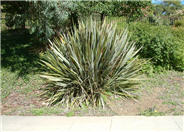
Common name:New Zealand Flax
Botanical name:Phormium tenax
New Zealand Flax is a large, bold plant with stiffly vertical, sword-like, green leaves that arise from its base. It should be grown under full sun for best color. Varieties will offer different growth habits and leaf color.
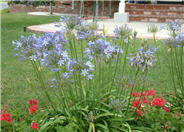
Common name:Dwarf Lily of the Nile
Botanical name:Agapanthus africanus 'Peter Pan'
WIth a growth of blue flowers between 12-18" high, this is a dwarf form of the Agapanthus.
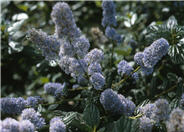
Common name:Carmel Creeper
Botanical name:Ceanothus griseus horizontalis
Carmel Creeper is one of the most popular forms of spreading shrubs. Its glossy oval leaves of 2" are bright green. The tiny light blue flowers are abundant and form 1" clusters. This shrub benefits from pruning. It does best in well-drained soil with little to no summer water.
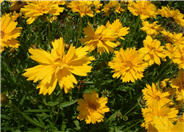
Common name:Double Sunburst Coreopsis
Botanical name:Coreopsis grandiflora 'Double Sunburst'
The 'Early Sunrise' is a wonderful cultivar and showy, southern U.S. native. Golden yellow double flowers on 2' bushy plants bloom from June to September in full sun and average to dry soils. It makes for good cut flowers, and pruning keeps the plants abundant with blooms. -Holland WIldflower Farm
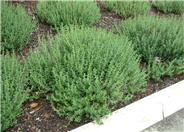
Common name:Trailing Germander
Botanical name:Teucrium X lucidrys
This mini-shrub with small, shiny, dark green leaves on woody stems can be sheared and shaped. The stems trail and rise to 24", with lovely reddish-purple flowers between the upper leaves. It can be used as a low hedge plant in herbal knot gardens. To encourage branching, it should be pruned in the spring. -Holland WIldflower Farm

Common name:Arctotis Daisy, African Daisy
Botanical name:Arctotis hybrids
African Daisy hybrids grow 12-18" high x 12" wide and produce daisy-like flowers from spring through summer. These hybrids have lobed leaves and bloom in whtie, pink, red, purple, cream and orange. For trailing African Daisies, see Osteospermum fruticosum, or 'Freeway Daisy'.
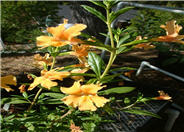
Common name:Sticky Monkey Flower
Botanical name:Mimulus aurantiacus
Sticky Monkey Flower is a drought tolerant evergreen shrub 4 ft. ft tall with numerous orangish/yellow flowers in spring and summer. It is a California native that attracts hummingbirds. This shrub can be found on the dry hills and canyon slopes in the Sierra Nevada foothills and the central Coast Ranges.
-Cornflower Farms
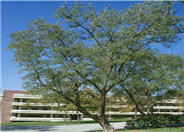
Common name:Olive, European Olive
Botanical name:Olea europaea
This broad tree will grow to 40' tall and has small, gray/green leaves with fleshy black fruit that appears in fall.
| Designer: | Hillside Above Circles of Color |
Photographer: GardenSoft |
Soils and Compost:
Physical weed control, including mulching, or hand removal protects the watershed from harmful chemicals.
Water Saving Tip:
The water needs of plants and lawns change dramatically throughout the year.
Visit the watering guide in the watering tips section for more information.
Integrated Pest Management:
Remove irrigation water and fertilizer from areas where you don't want weeds to grow.

